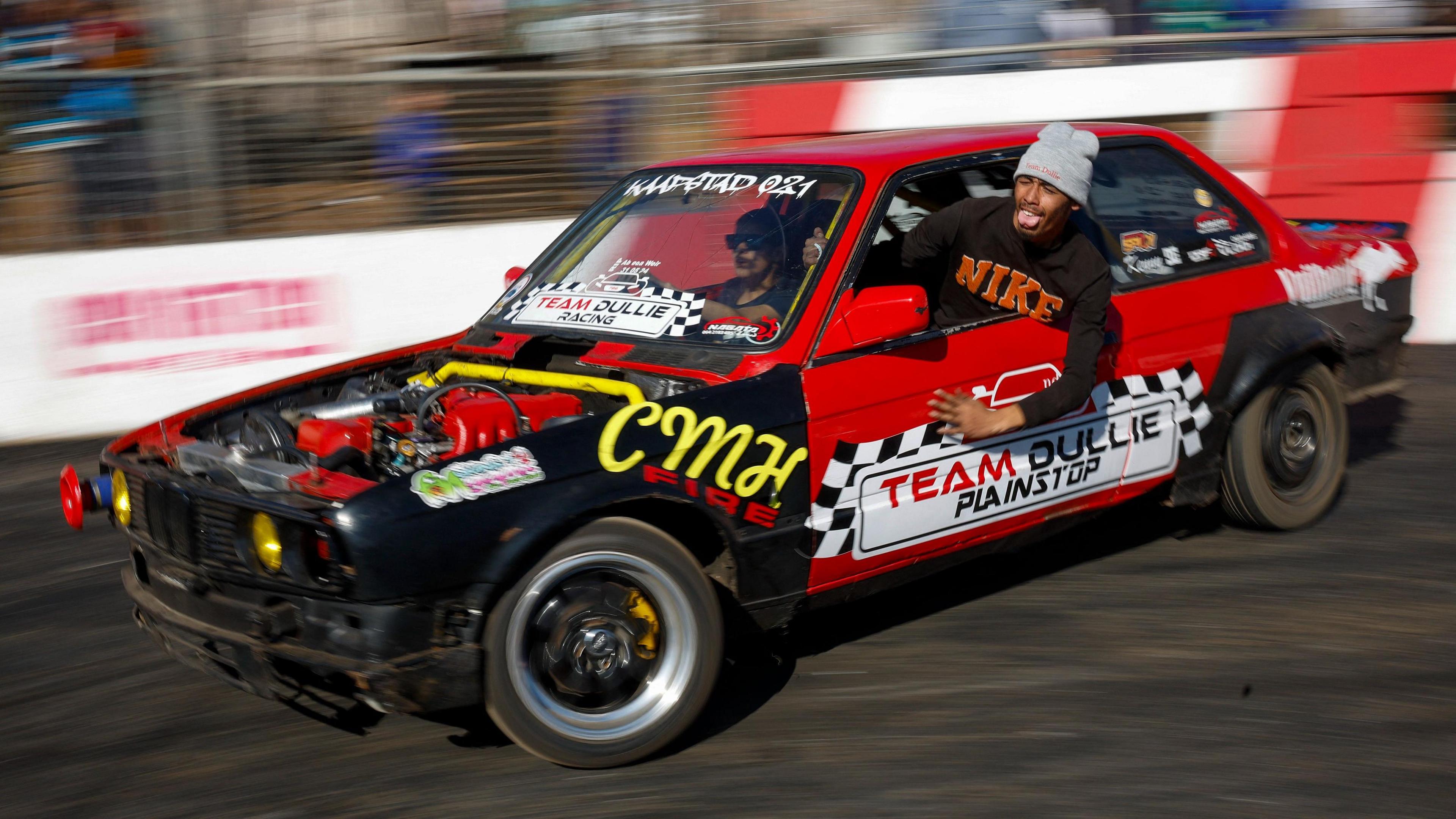Stunts, acrobatics, adrenaline - the motorsport putting fans in a spin

Spinning is a motorsport that involves elaborate acrobatics and stunts in a fast-moving car
- Published
Spinning's unique combination of stunts, acrobatics and burning rubber has made this Southern African motorsport an addictive experience for the likes of teenager Violet Chabaku.
Since originating in townships during the Apartheid era, when criminals showed off stolen cars and celebrated the lives of the recently deceased, it has evolved into a thriving sub-culture.
Families are drawn to regular meetings where noise, smoke and precision driving thrill the crowds, often in the thousands, and create stars of those who leave their seat behind the wheel to clamber upon the chassis of a vehicle - or even exit it entirely.
"I really enjoy the adrenaline," Chabaku told BBC Sport Africa.
"When I started I was super-excited to know everything. I wanted to do the stunts immediately."
As with most high-speed motorsports, spinning comes with inherent risks. A mechanical glitch or mistimed stunt while balancing yourself on the bonnet, sunroof or a door handle can result in serious injury.
According to Samkeliso Thubane, a top South African spinner nicknamed Sam Sam, the secret is knowing how to calculate your vehicle's movement.
"You are controlling a car that's not in control," he said.
"We know how to avoid anything that can go bad. Because we practice we are able to perform perfectly."
Chabaku's own worries diminished as she learnt the art near her home in the Free State Province.
"A lot of people fear it's too dangerous or something might happen to them," the 19-year-old explained.
"When I bumped the car for the first time I think my life flashed before my eyes.
"It was scary at first because you make a lot of mistakes. But once I got the hang of it, the fear is not there anymore."
Government backing

A former spinner himself, South Africa's sports minister Gayton McKenzie has announced funding for the discipline
Organised spinning events typically take place at designated areas on racetracks and tend to draw a working class following, while the more informal events on streets are usually illegal.
Yet what was a sub-culture could enter the mainstream in South Africa thanks to support from sports minister Gayton McKenzie, a former gangster who spent a decade in prison and was a spinner in his youth.
His ministry announced a sum of 5m rand ($272,000, £216,500) will be spent on promoting a discipline that McKenzie believes could become one of the biggest sports in the country.
"I've been to empty rugby and cricket games. I've not been to empty spinning events," he told BBC Sport Africa.
"It interests our children, attracts all ages and, as government, we should do what our people love. I'm going to make sure spinning takes its rightful place like rugby and football."
McKenzie thinks the joy brought to communities by car tricks even has the potential to reduce crime rates - albeit temporarily - in a nation which has one of the highest murder rates in the world.
"In Mitchells Plain (in Cape Town), for example, there are shootings every day. When there's a spinning event, the shooting subsides or stops."
Recognised as an official code by Motorsport South Africa in 2014, spinning has grown in leaps and bounds and shed the negative stereotypes associating it with the criminal underworld.
Chabaku was even introduced to the sport by her father Debby, a policeman.
"The concept that a lot of people have when they look at spinning is gangsterism," Debby explained.
"It's the mentality of people who do not come. This has nothing to do with illegal activities. This is a pure motorsports show [now]."
Female empowerment

A growing number of women are competing at spinning events, with Stacy-Lee May one of the most well known
One way in which spinning is succeeding compared to mainstream motorsport is in creating female stars such as Stacey-Lee May, who has featured on shows on Netflix.
Among Chabaku's role models is Kayla Oliphant, a woman just four years her senior and already a big name in South Africa.
Hailing from Kimberley, she enthrals crowds with the 'suicide slide' - her signature stunt which entails her raising her entire body bar one foot out of a moving vehicle.
The mother of one hopes to forge a career as a professional stunt driver and has already worked on one film.
However, she feels more needs to be done for women to get full respect from the opposite sex, despite annual shows such as Spinderella in Johannesburg promoting female talent.
"As women we have earned our stripes. However, we are not recognised as much," Oliphant told BBC Sport Africa.
"We have the capability. I have a three-year-old daughter and she loves the sport. I am hoping that one day she gets into it."
Picking the right wheels

Samkeliso Thubane, nicknamed Sam Sam, is one of the top spinners in South Africa
The ride of choice for most spinners is a BMW because the manufacturer's E30 model released in the 1980s was favoured by the sport's pioneers in townships.
Known in South Africa as a gusheshe, its durability helped cement its status among the spinning community.
"It's a car that can handle all the punishment that we take it through," Thubane added.
"When we're spinning, the car is always on the limiter. The engine, suspension and entire car goes through a lot."
Thubane's skills have seen him draw sponsorship from major companies, welcome backing for a costly sport which can entail engine fixes, waiting for spare parts and replacing burnt-out tyres, alongside travel costs.
The 32-year-old hopes to "go international" but sees a bright future for spinning in his homeland.
"Gayton McKenzie is going to fight and make spinning a recognised, official sport," he said.
"From where it started off to where it's going, a lot has changed. I don't know anyone in spinning who is a gangster. It unites all types of people."
Related topics
- Attribution
- Published15 April 2013